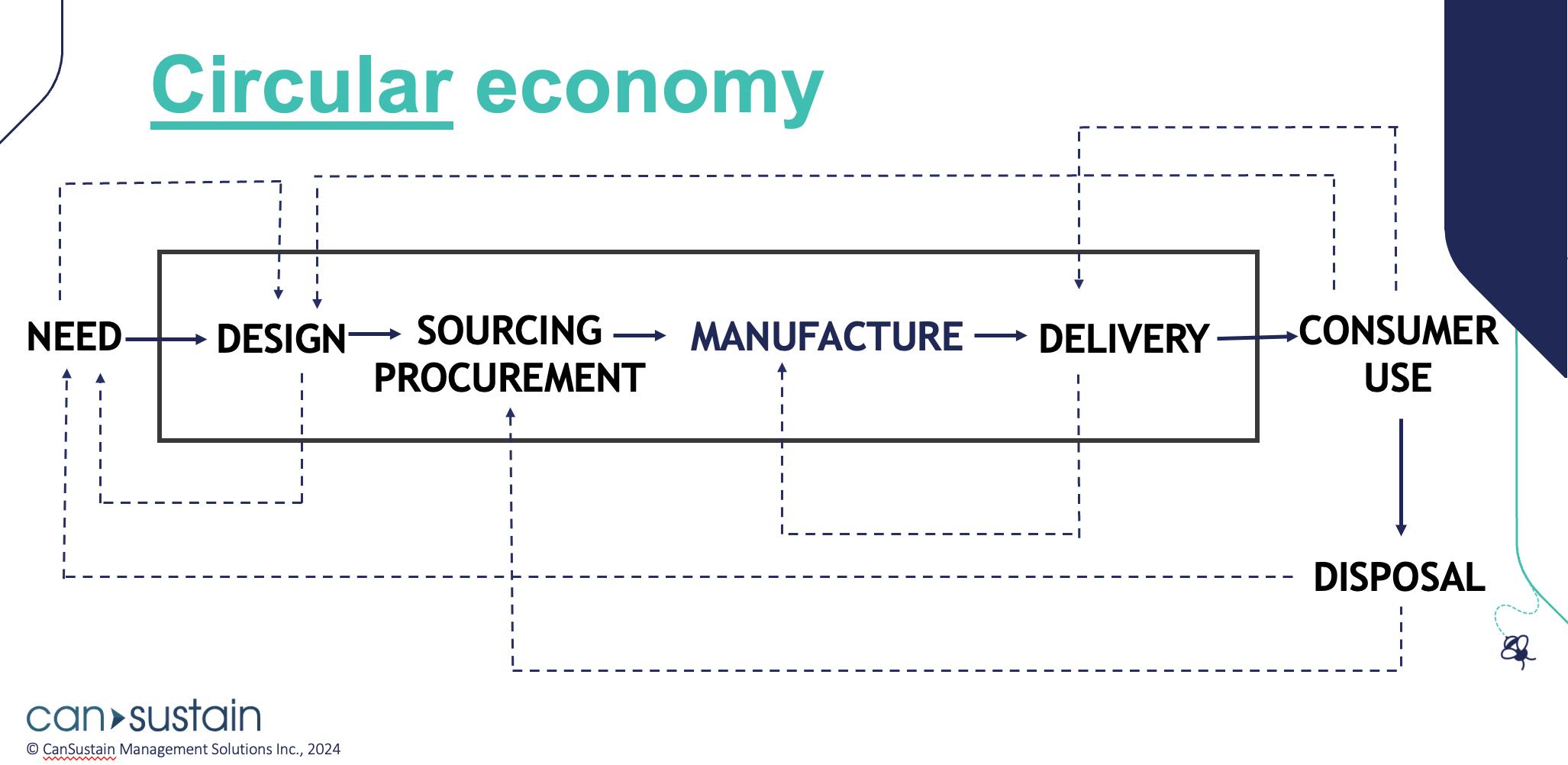2024 Sustainability Rounds Report

HealthPRO Canada’s third annual Sustainability Rounds brought together more than 200 stakeholders across the healthcare supply chain who are committed to shaping a more sustainable future for healthcare.
Beyond the Buzz: Real Strategies for Tangible Results, on April 30, 2024, featured discussions on building an effective business case for sustainability, harnessing the latest Infection Prevention and Control (IPAC) research to adopt sustainable protocols and tips on how to use HealthPRO Canada’s impact assessment tools to support carbon-conscious purchasing decisions that have a positive impact on the environment.
The event was the latest example of HealthPRO Canada’s commitment to provide members and suppliers with tangible solutions they can leverage to accelerate their social and environmental impact within the healthcare supply chain.
We invite you to review the report below for a summary of key takeaways from expert panelists and speakers at our third annual Sustainability Rounds. 68% of attendees joined from home, saving on emissions to get to the office


Tanis Ostermann
Principal & Founder of CanSustain, a Manitoba-based sustainability consultancy, delivered the keynote address at Sustainability Rounds.
What We Heard icon
Ostermann’s presentation – Foundations in Circularity & Opportunities for Healthcare Supply Chains – focused on principles of the circular economy and the importance it places on eliminating or reusing waste products. Ostermann maintained that circularity not only helps companies reduce their environmental footprint and reach sustainability goals, but also has a significant value proposition.“Waste is expensive … but for some reason we have a hard time pricing that into what we do. We’ve just taken it as that’s the cost of business, and it’s not.” she said.
She encouraged organizations beginning the journey to shift to a circular business model and declare their intentions to internal and external stakeholders, work with an internal champion to help build awareness, join networks to learn tips and best practices from others, and measure all waste produced to get a clearer understanding of its value proposition.
For most attendees, they are starting to implement circular initiatives but need to learn more to advance and scale these programs.


SUSTAINABILITY ROUNDS 2024 2
Keynote Speaker
Keynote Speaker
Key Takeaways

• A circular economy is an economic model that maximizes the value of all materials and energy in the value chain by continually reusing materials, using resources as effectively as possible and eliminating waste.
• Circularity increases material and supply chain resiliency.
• The circular economy is estimated to be a $4.5-trillion opportunity.

Call to Action
Suppliers can lead the charge in their markets and secure customers’ loyalty by launching a buy back program, which reduces the need for costly new resources while simultaneously helping their organization achieve its emissions reduction targets.
For members, circularity can be applied to healthcare settings in a variety of ways. Besides prioritizing products that can be recycled, repaired, or refurbished, consider how products can be reused or repurposed elsewhere in the hospital. For example, extending the life of reusable gowns by turning these linens into rags for cleaning staff to use.

SUSTAINABILITY ROUNDS 2024 3
Plenary Panel 1 The Business Case for Sustainability
Panelists




Colin Chan
Regional Leader, Sustainable Clinical Services
Vancouver Coastal Health
Marianne Dawson
Sustainability Advisor
British Columbia Provincial Health Services Authority
Ed Rubinstein
Vice-President of Business Development
Noventa Energy Partners
Lisa Vanlint

Manager, Environmental Sustainability Energy & Environment Team
University Health Network
Chair of HealthPRO Canada’s Member-led Sustainability Committee
What We Heard
While there’s a perception that sustainability initiatives may be costly and disruptive, panelists agreed organizations must also consider the cost of inaction to get an accurate picture of the business case for reducing their environmental impact.
“What else is expensive, and we know is going to be disruptive, is climate change. Quite literally, we cannot continue to work in the same ways that we have been working.” said Marianne Dawson, Sustainability Advisor, British Columbia Provincial Health Services Authority.
Measuring return on investment in sustainability isn’t simple because it’s not restricted to only quantitative factors. Organizations must also look at qualitative returns on their environmental action – such as enhanced quality of care and patient experiences, as well as improved working environments for healthcare staff.
Panelists encouraged participants to build relationships with internal teams to better understand what matters to them about improving sustainability rather than attempting to force an agenda on them.

SUSTAINABILITY ROUNDS 2024 4
Plenary Panel 1 The Business Case for Sustainability
Key Takeaways

• The business case for sustainability goes beyond reducing environmental impact –it also includes other benefits, such as patient safety, employee engagement, and financial savings.
• Don’t focus on statistics alone to engage audiences in your sustainability journey.
o It’s important to have a narrative to breathe life into your sustainability initiatives based on who you’re trying to reach and what they will take away.
• Creating a “green team” of internal champions can help create buy-in among employees and enhances their satisfaction in their roles overall.
• If demonstrating quick wins is central to your business case, start where you already know there is support.

Call to Action
Identify the cost of inaction for your organization and make it a central element of your business case. For example, the impact of wildfires due to climate change can be much more costly than the actual spend to advance your sustainability initiatives.
Similarly, the high burnout rate currently experienced by frontline workers may pose greater financial strain to the healthcare system than implementing climate-friendly actions that would create the conditions for a healthier environment and ultimately reduce the demand for healthcare services.

SUSTAINABILITY ROUNDS 2024 5
Live Demonstration Workshop
HealthPRO Canada’s Sustainability Toolkit

Alam Hallan
Director, Artificial Intelligence & Digital Products HealthPRO Canada
What We Heard

Hallan provided a live demonstration of our Sustainability Toolkit, which includes digital impact assessment tools to help members and suppliers measure their environment footprint and make informed decisions to improve sustainability.
Hallan walked through a variety of scenarios using the tools to help organizations measure and understand the long-term impact of common pharmaceutical products, such as anesthetic gases and inhalers which are particularly harmful to the atmosphere due to their high Global Warming Potential (GWP).
Hallan stressed that HealthPRO Canada is committed to fostering collaboration with members to enhance digital assessment tools and share best practices across its network.
To find out more about HealthPRO Canada’s digital impact assessment tools, contact HealthPRO Canada’s Corporate Responsibility Team at corporateresponsibility@healthprocanada.com


SUSTAINABILITY ROUNDS 2024 6
Live Demonstration Workshop
HealthPRO Canada’s Sustainability Toolkit
Key Takeaways

• Canada has significant room for improvement, given that our health sector is responsible for roughly five per cent of global greenhouse gas emissions.
• HealthPRO Canada’s digital assessment tools provide health organizations data to better understand the environmental impact of their purchasing decisions and make adjustments to improve sustainability.
• HealthPRO Canada is developing additional tools and developing more educational resources and welcome collaboration from our stakeholders.

Call to Action
Arm yourself with data in real time to quantify the impact of sustainability changes in your purchasing decisions.

SUSTAINABILITY ROUNDS 2024 7


Jon Otter
PHD, Director of Infection Prevention and Control Guy’s and St. Thomas’ NHS Foundation Trust
What We Heard
Dr. Otter focused on the environmental impact of Infection Prevention and Control (IPAC) practices in healthcare, including waste created by single-use Personal Protective Equipment (PPE) and medical devices.
While PPE is an important tool for patient and medical staff safety, overuse of PPE –particularly single-use items such as gloves and gowns – generates significant waste and carries a large carbon footprint.
Dr. Otter provided insights into overcoming barriers to sustainable practices in healthcare, emphasizing the need for value-based procurement and multi-disciplinary collaboration. He also speaks specifically of scenarios when healthcare professionals should or shouldn’t use single use protection so organizations can begin cutting waste and saving costs.
He stressed the long-term benefits and necessity of sustainability investments, considering both environmental impact and resource scarcity.
Key Takeaways
• Health organizations should focus first on initiatives that both improve sustainability and decrease IPAC risks.
• The three key areas where organizations can make the biggest gains to reduce waste and enhance sustainability include:
o Reducing excessive use of single-use gloves. Decreasing glove usage by 30 per cent would save 318 tons of carbon emissions, which is equivalent to 17 flights from London to Paris.
o Reducing overuse of single-use medical devices.
o Cutting down on unnecessary use of antibiotics.

SUSTAINABILITY ROUNDS 2024 8
icon
Is IPAC the Enemy of Sustainability? Roadmap to Reduction
Plenary Panel 2

Key Takeaways Con’t
• Embracing values-based procurement models rather than those that put the greatest weight on pricing will enable organizations to find solutions that improve quality, reduce cost and enhance sustainability.
• IPAC teams aren’t the enemy of sustainability – they can be an important partner at the table when it comes to informing decisions on reducing waste.
• Hospitals should work together with staff to provide awareness on when and when not to wear gloves and resuse them. Running education and reminder campaigns has helped many hospitals reduce their single-use glove waste.

Call to Action
Reduction is 100 per cent sustainable and cost neutral. Challenge your teams to pause and consider the IPAC case for the product you’re about to use, especially for single-use items.

SUSTAINABILITY ROUNDS 2024 9
Breakout Market Session

Charlie Sturr

What We Heard
Sturr provided participants an overview and demonstration of Watershed’s enterprise sustainability software platform, which is used by some of the world’s largest companies to manage, report and act on their sustainability goals.
Key Takeaways
• A growing number of companies are looking to automated digital tools to support sustainability initiatives rather than traditional practices of tracking them by hand.
• As more organizations factor sustainability into procurement and purchasing decisions, there is growing importance for healthcare organizations to gather data on their impact and mitigation efforts.
• New regulations across North America and internationally require more robust carbon emissions and sustainability reporting, putting an onus on healthcare organizations to understand their impact.
• Research suggests companies with sustainability programs have 40 per cent higher employee retention and 55 per cent higher staff morale.

Call to Action

You can’t reduce what you haven’t measured –monitoring and understanding your carbon footprint is key to reducing it.
SUSTAINABILITY ROUNDS 2024 10
icon
Climate Solutions
Consultan
Watershed
Emissions
Scoping Marketplace

Next Steps
As Canada’s national group contracting provider for healthcare, HealthPRO Canada has a responsibility to be a leader in sustainability, which includes empowering our members, suppliers and employees to consider sustainable practices. Whether it be on the social, environmental, or economic front, we are working with all of our stakeholders to identify and implement more sustainable practices from production of goods to delivery of care.
We were inspired by the energy and commitment of participants and our expert speakers at Sustainability Rounds 2024! We’re already thinking ahead to next spring and how we can make our next Sustainability Rounds even more impactful. For more information, please visit our sustainability page at www.healthprocanada.com/sustainability or contact our Corporate Responsibility Team by emailing corporateresponsibility@healthprocanada.com
Thank you for your participation in Sustainability Rounds 2024. We’ll keep you posted on our plans to amplify the conversation on environmental sustainability in healthcare.


SUSTAINABILITY ROUNDS 2024 11


SUSTAINABILITY ROUNDS 2024 12














